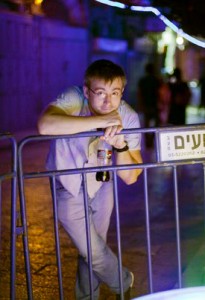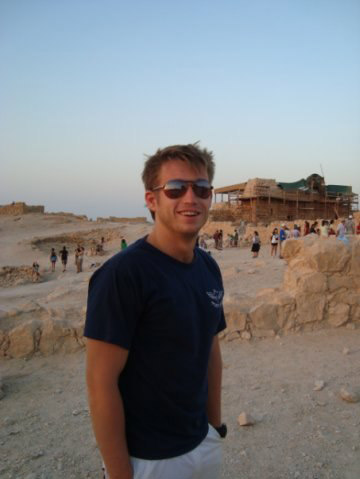The student Ivan Goncharenko wanted to prevent the Centre for Middle Eastern Studies from turning into an anti-Israel platform. That is why he contacted the Israeli ambassador concerning the course literature.
The last few days, there has been much controversy concerning the course MOSA20: Israeli-Palestine Conflict: History, Development and Alternative Solutions at the Centre for Middle Eastern Studies. The critique from the Israeli ambassador to Lund University was quite unexpected.

Photo: Private.
Several smaller incidents over the course of the semester finally convinced the student Ivan Goncharenko that he needed to do something.
“I don’t want to create a scandal. I love Sweden and have nothing against the Centre of Middle Eastern Studies. They have amazing professors, but some of the lecturers are political activists and I don’t want to have to pay for that. I want to affect change in the course, because I think it’s important that the centre is not harmed”, Ivan Goncharenko says.
Coupled with refugee camps
It all started during the first few weeks of the master’s programme. Ivan Goncharenko reacted to lecturers’ focus on “Israel’s occupation and colonisation” and their denial of any real anti-Semitism being present in Europe today. The director of the Centre for Middle Eastern Studies heard these statements, but did not contradict them, according to Ivan Goncharenko. Another lecturer referred to Israel as “the Zionist occupational machine”, without any reactions from anyone during the lecture.
During a roll call for one of the courses, Ivan Goncharenko responded that he was from Jerusalem, whereupon the lecturer directly started questioning him whether he was familiar with any of the nearby Palestinian refugee camps.
“Why did she connect me with refugee camps in front of the entire class? Several other students also reacted to this”, Ivan Goncharenko says.
Academic dishonesty
When time came to choose new courses in March, Ivan Goncharenko scanned the selection and was shocked that the course literature for MOSA20 was so one-sided. He chose a different course, but could not forget about the syllabus for MOSA20.
“The course books are well worth reading, but it’s wrong to just represent one side of the conflict. To have them make up the entire course literature is academic dishonesty. All countries make mistakes and should be open to criticism; Israel is no exception. However, the academy cannot ignore the Israeli voice and become a platform for anti-Israel propaganda”, Ivan Goncharenko says.
Not only Israel and Palestine
In March, Ivan Goncharenko wrote a letter to the Vice-Chancellor Torbjörn von Schantz, but he received no reply. That is when he chose to contact the Israeli ambassador.
“I think it’s strange that the Centre for Middle Eastern Studies dedicates so much of an academic year to Israel and Palestine. So far, we haven’t had any courses on Iraq, Iran or any other Arabic country, but Israel and Palestine have been brought up on several occasions”, Ivan Goncharenko says and continues.
“Also, someone should have looked over the course literature more thoroughly before the course started. When I studied at the Hebrew University in Jerusalem, I read each book on that list, and I know them to be one-sided”.
Problem-ridden course
Students that take the course have also reacted to its contents, and they do not share the course management’s view that no one has voiced complaints.
“The course responsible, Nina Gren, hasn’t asked any students taking the course what they think about it, which is odd. There are some students who experience anxiety in the course”, says David Nri, who currently studies MOSA20.
“But, it’s unjust critique from a student who has not taken the course, and I think it was unnecessary for the Israeli ambassador to criticise the course literature”, he says.
Change the course name
David Nri is of the opinion that the Israel-Palestine conflict has many different aspects that need to be elucidated.
“There was an Israeli perspective in the course, as one of the lecturers was from Israel. The conflict is very complex and needs to be addressed from all angles”, David Nri says.
“It’s problematic when all lecturers but one have signed the BDS (the international campaign Boycott, Divestment and Sanctions Movement against Israel, editor’s note). This makes the course, at least appear, one-sided.”
What should change about the course?
“Invite a greater variety of lecturers. Or, as suggested by the Director of the Centre, Leif Stenberg, make alterations in the course literature.”
“Or, they can just change the name of the course to, for example, “Critical Approaches to Palestine”. The course name creates a lot of problems, as “History, Development and Alternative Solutions” are such disputed issues. To represent these arguments to everyone’s satisfaction is very difficult, especially when some of the parties have not even taken the course”, David Nri says.
Click here to read the MOSA20 syllabus.
- READ ON: Director of the Centre: The Course Is Not One-Sided
- READ ON: Israel’s Ambassador Criticizes the University
Text: Carl-Johan Kullving
Translation: Sofia Nordstrand






